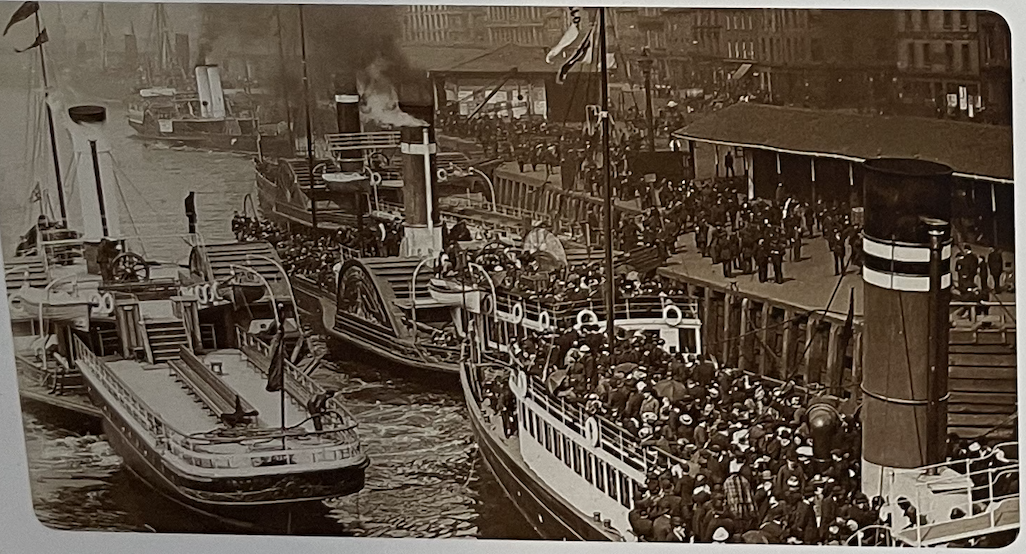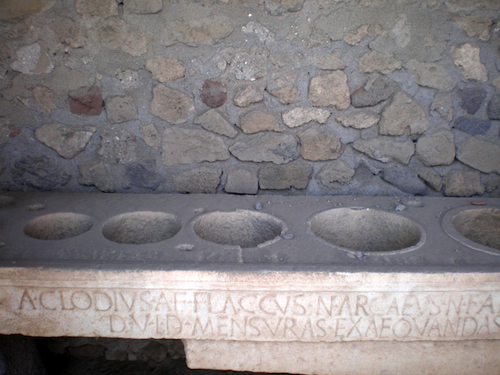Various forms of regulation are needed to underpin efficient commerce. And more developed countries go on to use regulation to protect their citizens, and to require them to behave ethically towards each other. Here are some notable historical developments.
The Earliest Laws
Hammurabi, King of Babylon, detailed his subjects' obligations, and set out fierce punishments for their transgressions, nearly 4000 years ago.
(Babylon was a major city in Mesopotamia, in the northern part of 'The Fertile Crescent' where systematised agriculture first developed.)
The Persians subsequently developed a highly educated bureaucracy to administer their sprawling empire which incorporated many different peoples. Amongst many other things, they validated the quality and quantity of goods sold in market places.
Monopolies
The evils of monopoly and other excessive market power have been recognised for millennia.
- c. 2100 BC - Hammurabi, King of Babylon (see also above), promulgated a code referring to monopolistic prices.
- 347 BC - Aristotle used the word 'monopoly' in his Politics books, in a discussion of people who cornered the market by buying up all the oil presses and all iron, selling later for a high profit at a time of urgent demand.
- c. 160 BC - Cato the Elder referred to associations between rival companies so as to establish monopolistic prices.
- c. 79 AD - Plinius the Elder recorded frequent complaints of citizens against the extractions of monopoly.
- 483 AD Emperor Zeno prohibited all monopolies whether created by Imperial decree or by private action, combinations and price agreements.
Rulers and governments have frequently granted monopolies in order to reward loyal subjects at no cost to themselves and/or (by selling the monopoly) to enrich themselves without being seen to impose taxation:-
- Queen Elizabeth I granted a large number of abusive monopolies covering many household items such as salt or starch, eventually causing great concern as they caused serious financial distress to many of her subjects:
- Sir Walter Raleigh held monopolies for tin and playing cards
- 'Send for [the monopolists], send them to the Tower, there to remain until they have ... made some part of restitution to some of the poorest that have been oppressed by them' - John Davies, Speaker of the Irish Parliament
- The Thatcher government privatised several monopolies, receiving large sales proceeds as a result. But the simultaneous creation of strong utility regulators ensured that competition was eventually introduced where this was possible, and prices were controlled where competition was ineffective.
- Russian Yeltsin-era privatisations created quite a number of phenomenally rich oligarchs at the expense of the wider Russian people.
Tradesmen's Guilds were another form of monopoly in which butchers, tailors, mercers etc. wielded more power as a group than they did individually. They controlled entry to the trade, agreed minimum prices, and fined those who traded without becoming members, and their members often became extremely rich - but they also provided care for their members and families in hard times.
The Black Death was felt at the time to have unleashed an orgy of profiteering and was met with a good deal of regulation. The1349 Ordinance of Labourers was intended to control rising wages but also ordered a halt to escalating prices for victuals (food and drink). Later that year a writ proclaimed against merchants 'forestalling the market' - that is entering into future purchase contracts, and stockpiling.
Meanwhile, much further north ...

Fierce paddle ship competition along the Clyde led to the mid-1800s Glasgow magistrates introducing a £5.00 fine for services running late to prevent 'the Masters of Steam Boats, from improper competition and rivalship, postponing their departure for considerable and uncertain periods'.
Anti-trust legislation (i.e. competition law) was introduced in the United States via the 1890 Sherman Act which attempted to outlaw the restriction of competition by large companies, who co-operated with rivals to fix outputs, prices and market shares, initially through pools and later through trusts. A significant target was John D Rockefeller's Standard Oil Co.
Competition law arrived in Europe in the inter-war years, with Germany enacting its first anti-cartel law in 1923 and Sweden and Norway adopting similar laws in 1925 and 1926 respectively. However, the Great Depression caused competition law to fall into disuse.
The UK's broadcasting monopoly - the BBC - was created in 1922 following a proposal by Marconi and other private sector wireless manufacturers who offered to collect a ten shilling (50p!) licence fee (on behalf of The Post Office) when selling their wireless sets. Radio – or ‘wireless telephony’ as it was called - was regarded as a development of the telegraph service, which explains why the Post Office was given powers to license early broadcasts. By the spring of 1922, the manufacturers, eyeing developments across the Atlantic, were impatient to start selling radio sets, but their potential customers needed something to listen to. Twenty-four firms had applied for licences to launch regular programmes of speech and music. The Post Office was, however, dragging its feet amid exaggerated fears of ‘chaos’ on the American airwaves. The US authorities certainly did encourage much more competition, thus leading to today's wide choice, funded by advertising, with all its associated strengths and weaknesses.
The Second World War forced the creation of numerous cartels and monopolies. Competition policies were only revived in Europe - first of all in the UK and Germany -in the late 1940s and the 1950s following pressure from the United States.
There is a good summary of the history of competition law in Wikipedia.
Price Controls
Although usually introduced with the best of intentions, price controls usually make things worse. They were enacted in ancient Mesopotamia and also by the Ancient Greeks who threatened to execute people if they broke them. Greek traders ignored them and so the Greeks did not starve to death. The Romans, in the form of Emperor Diocletian, implemented his Edict of Maximum Prices which led to a collapse in trade and starvation.
Robespierre introduced the General Maximum during the French Revolution and the Reign of Terror. Once the people began starving to death the price controls were scrapped.
In the aftermath of the Second World War the Allied Powers introduced price controls in West Germany. Again, although well-intentioned, they led to severe shortages of essential goods. The Minister for Economic Affairs decided to scrap them without telling the occupying authorities and the shelves soon began to fill and ordinary people could get what they needed. West Germany was then on its way to recovery.
Standardisation, Harmonisation, Weights, Measures, and Health & Safety
The Bible requires weights and measures regulation:
Just balances, just weights, a just ephah, and a just hin, shall ye have." (Leviticus 19)
(An ephah is a unit of dry measure, similar to a bushel. A hin is a unit of liquid measure, equal to c.5 litres.)

Regulations protected Roman citizens against being sold under-weight goods. The above photo is of Pompeii's Mensa Ponderaria:- the table with the town's official measures which guaranteed the citizen against fraud by shopkeepers and merchants. The table has 9 holes, each with a hole in the bottom so that the product being measured could pass through. It was first used by the Oscans before the Romans came to Pompeii. When the Romans arrived they modified the measures and this is recorded in an inscription which can be seen in the picture on the front of the table. It reads: 'Aulus Clodius Flaccus son of Aulus, Numerius Arcaeus Arellianus son of Numerius, Duovirs with the power of law, gave this by the decree of the Decurians for the measures to be equaled out.'
 The photo on the left is of a marble block from Laodicea in Turkey, dating back to AD114. It is inscribed with the local water law which contains strict measures regarding the use of water which had to be channeled from the nearby Karci Mountain. There were heavy penalties, ranging from the equivalent of £10-30,000 in today's money, for those who polluted the water, or damaged the supply infrastructure. And whistle blowers were awarded 1/8th of the penalty.
The photo on the left is of a marble block from Laodicea in Turkey, dating back to AD114. It is inscribed with the local water law which contains strict measures regarding the use of water which had to be channeled from the nearby Karci Mountain. There were heavy penalties, ranging from the equivalent of £10-30,000 in today's money, for those who polluted the water, or damaged the supply infrastructure. And whistle blowers were awarded 1/8th of the penalty.
Nearer home Roman procurators were responsible for drawing up regulations for the safety of their British coal and metal mines.
Many years later, in England, King Edward legislated in the 900s to standardise weights and measures across the country.
SMEs in London in 1310 were no doubt incandescent with rage when 'health and safety' zealots succeeded in promoting legislation under which tailors and pelterers were forbidden from scouring furs in the main street on penalty of no less than imprisonment. A 1357 law then established laws against leaving dung, crates and empty barrels outside the doors of London houses, and a 1371 law forbade the slaughtering of all large beasts within the city.
The Imperial system of measurement was standardised in Westminster's Jewel Tower, one of the two principal remaining elements of the original Palace of Westminster, the other being Westminster Hall. The work was carried out by the Board of Trade's Department of Standards who moved into the tower in 1869. The thick-walled tower was though to be an ideal place for such precise work but and the department only moved out in the late 1930s when traffic outside caused too much vibration. Here are some of the standards from those times:


Not far away, these and other Imperial standards were placed in Trafalgar Square in 1876, and can still be used today.


The European Single Market was completed in 1993.
Building Regulations
Thatched roofs were banned within the City of London by building regulations dating back to 1189. These rules were reinforced after a terrible fire in 1212 when an estimated 3000 people died. Shortly after this fire, the City authorities ruled that all new houses had to be roofed with tiles, shingles or boards. Any existing roofs with thatch had to be plastered. The medieval regulations appear to have been successful in preventing large-scale fires. John Stow, in his 1598 Survey of London said ‘since which time [referring to introduction of the rules], thanks be given to God, there hath not happened the like often consuming fires in this city as afore.’ By 1666, the vast majority of houses in the City would have been tiled. Even if there were a small number of thatched buildings lurking in the densely-packed streets, they were not in significant numbers to be noted as a cause of the Great Fire of 1666.
Also Royal proclamations from 1605 demanded that new buildings in London be built from brick.
Londoners were served (if that is the right word) by cesspits until the 1800s when brick sewers began to be built. The Building Act 1844 required all new buildings to be connected to sewers. Joseph Bazalgette was appointed around 1850 to develop a coordinated and systematic scheme for the capital's sewers.
Commercial Law and Social Legislation
Sumptuary laws replaced the constraints of feudal systems from around 1200 to 1800. They restricted excessive personal expenditure on items like clothing, food, and luxury goods, often to maintain social hierarchies and moral standards. Only nobles could wear ermine and men's coats had to be long enough to cover 'their shame'. These laws were mainly aimed at preventing individuals from dressing or living beyond their social rank, but they were often difficult to enforce and frequently ignored.
In 1515 William Shakespeare's father was fined for littering.
Developments such as company law (the 1844 Joint Stock Companies Act and the 1855 Limited Liability Act) gave protection to company owners against their company's creditors, and patent law did much the same in the field of intellectual property.
There was also much social protection legislation in the 1800s - see box below.

The late 1880s and early 1900s also saw children begin to receive protection from abusive parents and guardians, even though one judge noted that 'the father knows far better as a rule what is good for his children than a court of justice can'.
There has more recently been a flurry of regulation providing employment rights, including protection against unfair dismissal, sex discrimination, unreasonably low pay and excessive working time.
Railways
Railway safety has an interesting history.
Responsibility for improving railway signalling, for instance, was initially left to railway companies with the result that railways were generally a very safe mode of transport, but progress in some areas was glacially slow. Some very simple and effective measures were opposed by some macho railway companies who felt that their staff should not be mollycoddled by protective devices such as lever collars to stop signal levers being mistakenly moved to a clear position. The safety issues thus persisted, and easily preventable accidents continued for decades.
Other improvements would have cost more but, looking back, it is hard to understand the railway companies decades-long resistance to the abolition of gas lighting which frequently led to intense fires following otherwise survivable collisions. Perhaps the worst was a 1915 troop train accident which killed over 200.
Much the same can be said of ‘Automatic Train Control’ whose introduction was noted as imminent in 1923 and was indeed soon adopted by Brunel’s Great Western Railway – but was not adopted on the East Coast main Line for another 40 years.
Eventually, however, Parliament took a more interventionist approach including through giving enforcement powers to the Health and Safety Executive (HSE) and approving the Railway Safety Regulations 1999. But serious accidents continued, at least in part because of a continuation of the historic consensual approach to safety improvement. This led to serious if implicit criticism in reports following the privatisation of the railway industry, and the Southall, Ladbroke Grove and Hatfield accidents:. Here is an extract from an HSE report:
“[The Inspectorate] has followed a consensus-seeking approach … with a reluctance to use formal enforcement powers. The ‘light touch’ approach was derived during a political climate of deregulation … Such an approach is less appropriate for an industry which is more driven by commercial imperatives and in which levels of co-operation and trust appear to be declining.”
More please!
Please do not hesitate to send me further historical snippets or images which might be added to this page.
Recent History
Significant regulatory developments are summarised here.